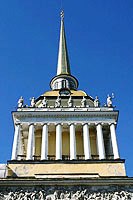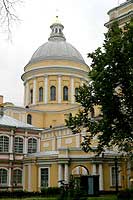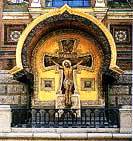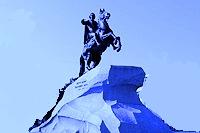|
Legends about Saint PetersburgThe founding of Saint Petersburg On the sixteenth day of May, at Pentecost, Peter the Great, accompanied by priests and his close associates arrived at Zayachy Island in a boat. After the water and the place had been consecrated, Peter took a spade and began to dig a moat. At that moment an eagle appeared in the sky and flew down hovering above the island as if giving a sign of blessing from the heaven. A rich Englishman in his old years decided to visit the Russian capital. His only wish was to see the wonderful railings of the Summer Gardens. When his ship entered the Neva and anchored near the Summer Gardens the old man, struck by beauty of the railings, refused to go ashore and left Saint Petersburg. He declared that he could not see anything more fascinating than this work of art. While living in the wooden palace Elizabeth used to feed numerous homeless cats, which having known about generous Empress would assemble there from all over the city. In the course of time new buildings appeared at the place of the wooden palace but memories live long - even nowadays one of the buildings in this area is called in the city's folklore "The Cat's House." Once a guard standing on the watch of the Summer Palace had a vision of Archangel Michael who ordered him to go to Emperor Pavel and tell him that the Summer Palace should be destroyed and in its place a temple should be built in honour of Archangel Michael. The soldier did what the Archangel had told him. Having listened to his words the Emperor said: "Let it be as He had said!" That same day the Emperor ordered that the palace and the church of Archangel Michael should be built But actually he broke his promise for he was told to build a temple in honour of Archangel Michael but not a palace. Once monk Abel asked the Emperor: "Why didn't you carry out the will of Archangel Michael exactly? Neither tsars nor peoples may change the will of God. I see your tomb in that palace, Your Majesty. And it won't be your heirs' residence either. A slightly orange-tinged brick colour for the Castle' chosen by Emperor Pavel himself. Once at the ball, favourite dropped her glove. The Emperor saw the glove and picked it up. He was so infatuated by the lady question that he ordered to paint the Castle with the lour of the glove. The voice of Peter the Great was heard in the Castle and Pavel I himself once saw the shadow of his grandfather Peter the Great showed Pavel the place in front of the castle gates where his monument should stand. That very night Peter the Great warned Pavel that his reign would not last long. At the hour when the Emperor was murdered a huge flock of ravens flew up from the roof of the Castle. In the city folklore, there still lives a legend that every year in March, exactly at the hour when Emperor Pavel was murdered, the ravens regularly fly up from the roof of the Michailovsky Castle . It is still believed that Emperor Pavel did not leave his favourite refuge - his ghost is still living here. The cadets of the Engineer's Military School used to say that exactly at midnight the shadow of the murdered Emperor with a candle in his hand would appear in the windows of the first store. Many people said that they had seen the ghost of the Emperor playing the flute. Even nowadays the parquet in the Castle's halls is sometimes mysteriously creaking without anybody's walking there, the doors suddenly and unexpectedly open without anybody's touching them, and the windows fly open even if there is not the slightest wind. As if under a spell, the employees who are present at those moments put aside their work and greet the invisible Emperor: "Good afternoon, Your Majesty!" Emperor Pavel's tomb in the Saints Peter and Pavel Cathedral is believed to have a magic power, so a lot of People come there to worship Emperor's relics. It is even believed that it has the power of healing from diseases. The icon of the Mother of God miraculously appeared to the Russian warriors in 1552 before the storm of the town Kazan by the troops of Ivan the Terrible. Since then, it was greatly worshiped in Russia . It was the Kazan icon of the Mother of God that inspired the Russian people who under the command of Minin and Pozharsky liberated Moscow from the Polish invaders in 1612. During the march towards Moscow , the Kazan icon was kept in the camp church of the Russian troops. Russian people have always believed in the miraculous power of the Kazan icon of the Mother of God. There is a legend telling that before the historic battle at Borodino in 1812, Marshal Kutuzov rode through the desposition of the Russian army with the Kazan icon of the Mother of God. Even in the times when the bolshevics ruined churches and destroyed icons, the Kazan icon of the Mother of God did not leave St. Petersburg . People believe that the Kazan icon of the Mother of God saved the blockaded Leningrad during the Great Patriotic War against the Ger-man fascists. Old people say that in January 1944 the Kazan icon of the Mother of God was brought to the front line of the desposition of the Soviet Army and it blessed the Soviet soldiers to the heroic break up of the Leningrad blockade. The Church of the Christ Ressurection Alexander II succeeded his father on the throne at the age of 37. All his life he lived under the sign of mysterious prophecy made at his birth by the "God's fool" Fyodor who foretold that Alexander "will be strong, mighty and glorious but he will die in red boots". During the official visit to Paris in 1867, Alexander visited a famous woman fortune-teller who told him that there would be eight attempts upon his life and he would escape death seven times but the last attempt, the eighth, would be fatal. The prophecies came true. Alexander II glorified himself by abolishing serfdom in Russia but, if to understand the symbolic character of Fyodor's prophecy, he really died "in red boots". Alexander II was assassinated by Grinevitsky, a member of the terrorist organisation. The bomb, thrown by the terrorist, exploded at the Tsar's feet. It was the eighth attempt upon his life. |

  






|
||||||||
